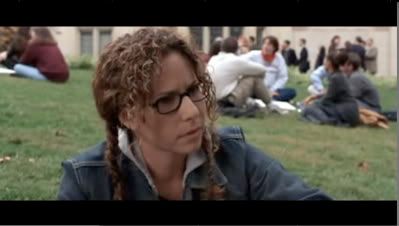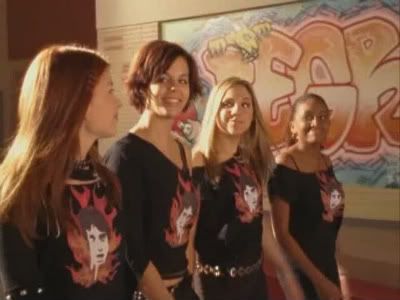While I'm not into making rules for artists, I have come up with some pitfalls to avoid and some issues to consider. The following guidelines are meant to assist anyone who wants to express opinions and ideas about sexual assault while still being respectful.
1. Don't make fun of survivors and/or use the survivor community to 'prove' any kind of point.
I hate to give her any more attention, but sometimes people need to be called out. Last week I read over at Shakesville about how Susannah Breslinposted to her blog about not knowing what a trigger warning is. Breslin writes that she googled the term, and now that she knows what it is, she thinks it's a) counter-effective and b) proof that the feminist movement is no more than a motley collection of 'ugly', man-hating, 'nit'-picking, Enid Wexler types who do nothing more than blog about being "victims of a patriarchy that no longer exists." Right.
I agree with Vanessa over at feministing that Breslin was being disingenuous. She knew what a trigger warning is. She pretended to not know just so she could write something provocative in a negative, fire-in-a-crowded-theater type way.
Breslin's treatment of assault survivors and the activists who support them is despicable, and it's also poor journalism. The purpose of journalism is to communicate news and ideas to people; it's not meant to be used as a tool to ridicule people, or as in this case, to diminish peoples' traumatic experiences. (This applies to any and all forms of communication or art, so don't misuse zinewriting, songwriting, or any other medium that way, mmkay?)

2. Think long and hard before writing from a survivor's perspective if you aren't a survivor yourself.
The aforementioned affair got me thinking of the three-episode arc on Degrassi: The Next Generation where Paige is date raped, and is thus very upset when her bandmate Ashley unknowingly writes a song about being raped called "Poor Thing". (For those not familiar: here's a video of the band rehearsing the song).
Ashley had not been sexually assaulted, but still wanted to write a song about it, probably to raise awareness. This is admirable, but Ashley doesn't realize that she's still using her non-survivor privilege in order to write and perform this song, and doesn't seem to realize that her song might trigger a trauma survivor. It takes Paige storming out of rehearsal, and tearfully talking about her experience for the first time, to make Ashley understand that her song is a bit problematic.
So Paige confides in her bandmate, decides to work on the song, contributes to it, and performing "Poor Thing" ends up being empowering for her. Ashley ends up helping her bandmate to face the trauma she's experienced, and to start her recovery from it. But in order for all of that to take place, Ashley had to listen to Paige's story. This is key: it's awesome to want to bring attention to issues around sexual violence, but you can't do it effectively without connecting with, or at least actively listening to survivors and contemplating their words and feelings.

3. Don't write about clubbing and then say you're actually making a profound commentary on date rape.
Earlier this month feminist writers and bloggers over at feministing, Bitch, RH Reality Check, and elsewhere spent days dissecting Kiely Williams' "Spectacular". In the song, the narrator brags about how she got SO wasted the night before, after letting some guy buy her lots of drinks and dance with her, but how she can't even remember his name, but somehow, she does remember that she went home with him, slept with him, and that the sex was 'spectacular'.
Some feminist writers argue that because of the lyrics about inebriation (and thus, compromised ability to legitimately give consent), the song is essentially a tale of date rape. These authors have criticized Williams for glamorizing date rape through the video, which is a pretty literal representation of the song: Kiely goes to a club, Kiely gets down, Kiely really gets down, Kiely wakes up at the guy's place and then does the 'walk of shame' home. Here, watch it for yourself:
Though critical, feminist writers have also pointed out that it's inappropriate to criticize women's expressions of their sexuality. If Kiely, or any woman, wants to get falling-down drunk and go home with a person she doesn't know, well, that's fine, if she really thinks that the whole experience is 'spectacular'. And frankly, that's the impression I get from the video and the song: it has no cognizance of date rape or consent issues; it's a song about partying.
But Williams has not defended her song as a club hit or party jam. She hasn't defended her right to casual sexual encounters. Instead, she's responded to feminist criticisms by claiming that the song isn't intended to glamorize such behavior, but to expose the truth of date rape and the horrors of hook-up culture.
The thing is, based on the video and the tone of the song, I don't buy it. As I understand it, Williams is appropriating feminist ideas to justify the song and video's objectionable content. She's using the discourse on date rape to try and pass off her work as social commentary, and I find it incredibly offensive. So, final tip: don't write about sex, and then say you're writing about rape because you're not willing to defend your sexuality and sexual experiences. It's an insult to those of us who do own our sexuality, and those of us who are survivors.
There are definitely songwriters who have gotten it right though. All we can do about rape culture is resist it, from whatever place we happen to be coming from, and by being conscientious of other people and their feelings. I'm ending this post with two examples of exactly that.
Trigger warning: Amos' song isn't that graphic, but it is harrowing and intense. Please watch with caution.
This song is intense in a different way, it's pretty intensely enraged, and rightfully so. Props to the men of Fugazi for writing a song about rape culture, and how pervasive it is, from the perspective of men.
5 comments:
Helloo thanks for the sweet comment. I like the way you write. totally informative You have alot to say which is totally coool.
Yes on the zine please ;]
-Shirley
I'd like to know your thoughts on The Raveonettes "Boys Who Rape (Should All Be Destroyed)" from their most recent album In and Out of Control. I reviewed the album and wasn't sure what to make of it. It seems straightforwardly anti-rape and yet the tone is so strange that I'm very uncomfortable with it. Amanda Hess over at The Sexist found it pretty weird too. She has a whole series on date rape anthems.
@Shirley: Thanks so much! I'll definitely get in touch if my poor zine ever gets finished.
@Bad Idea Potluck: You are super-shouted out in today's post! Thank you very much for your question, and for telling me about the song, and also about Amanda Hess. A series on date rape anthems!?!? I'm a geek so that's really exciting to me.
I've been in an emotionally abusive relationship, but never been raped. I also worked in a abuse and sexual assault shelter where we trained women to respond to rape victims in the hospital. I learned a lot and heard a lot of women's stories. There is a lot of strange biases about rape or abuse in young peoples' minds.
Also, with that song about going clubbing, I didn't watch the vid, but I have to say, in that instance I'd only consider it rape if the woman herself considered it rape and felt violated. Like you I don't buy the story the songwriter has made up, though.
Maggie, thank you for sharing your story. I too was in an emotionally abusive relationship, when I was in high school. And thank you for validating my interpretation of Kiely Williams' response to her critics! I don't meant to attack her or single her out, but I just don't believe her.
Post a Comment